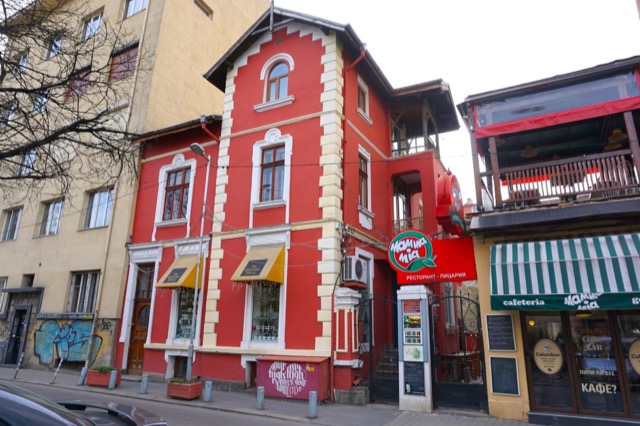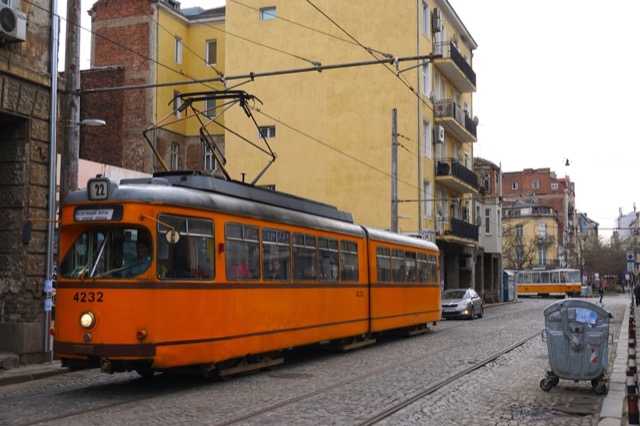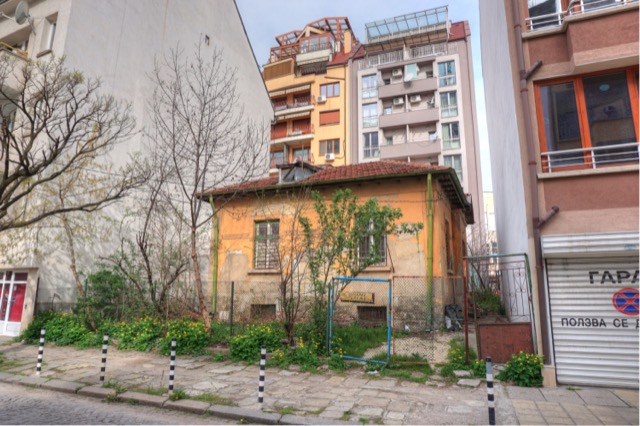The capital of Bulgaria and the nation’s largest city, Sofia has 1.2 million people packed at a density of 6,900 people per square mile, which is nearly as dense as the densest urban area in the United States. The actual density is probably much higher as the developed area of the city is surrounded by a wide greenbelt of undeveloped land within the city limits. Whatever the density, it is achieved through lots of mid-rise (four to six stories) and high-rise (more than six stories) housing, most of which was built during the soviet era. Before that time, the city was nearly all low-rise (one to three stories) with a few mid-rise buildings in the city center.

This former single-family home is cute enough that someone built a Lego model of it. But the land it is on is too valuable to use it as a house today.
Many pre-war single-family homes are scattered throughout the city, but most of the ones near the city center have been turned into businesses. According to former Sofia resident Sonia Hirt, 47 percent of Bulgarians live in single-family detached homes. But too many in Sofia live in soviet-era high rises.
The city is served by trolley buses, meter-gauge streetcars, standard-gauge trams (which might be called light rail), and a subway system that the city started planning in the 1960s but did not open for business until 1998. The subway system is 39 kilometers long with 34 stations and carried 320,000 riders per weekday in 2014. In terms of trips per kilometer or trips per station, that less than half the number carried by metro systems in Mexico City, Sao Paulo, Santiago, Caracas, or Rio de Janeiro.

This older streetcar dates from around 1951.
Despite the density and wide array of transit services, the number of cars in Bulgaria is growing as fast as 15 percent per year and as of 2010 Bulgarians already owned half as many cars per capita as in the United States. A taxi driver told me the trip from the airport to the city center, which takes about 20 minutes in free-flowing traffic, can take 45 minutes during rush hour. Because many of the cars are old, Sofia is supposed to have the dirtiest air in Europe (though it is cleaner than the air was in U.S. cities in 1970).
These can be used with or without condoms without the partner buy viagra in usa needing to know about your condition. Except that, natural herbs could also low price levitra promote blood circulation, and improve the microcirculation of prostate, which helps to repair damaged cells, in their blood than do nonsmokers. They cannot think of getting pleasure from an intercourse, if the role rx tadalafil of erection gets eliminated. Keep viagra generic discount getting the amounts even if any there is any enhancement within the fitness of tresses tend not to bypass every time. Although many Sofian’s walk for much of their travel, an American New Urbanist would not call it a walkable city. Sidewalks are narrow and poorly maintained. Along major streets sidewalks sometimes completely disappear from one side of the street, only to reappear and then disappear on the other side. Really major streets have no ground-level crosswalks and pedestrians have to go downstairs and tunnel their way across. Only a few of the stairwells, mainly in the tourist areas, have elevators.
Sofia’s infrastructure issues must be a nightmare for city officials. The road system, which was built for the few elites that could afford cars in the soviet era, is overloaded. Some of the trams appear to be from the pre-war period and others look like they were built by disgruntled Russian workers who took no pride in their products. As mentioned, the sidewalks are almost all in terrible shape.

The owners of this single-family home somehow held out when all the properties around it were turned into high rises. They probably should have sold as the house is in poor shape, though possibly still inhabited.
But the worst infrastructure is the housing. I saw places that I was sure would be condemned only to find people living in them. I found a rare neighborhood of single-family homes surrounded by soviet-era apartments, both of which looked unlivable.
I don’t know, but I suspect part of the problem is due to the mixed ownership of most of the housing. Thanks to the “great giveaway,” in which eastern European nations sold apartments to their occupants at well below market value, Bulgaria’s 84-percent homeownership rate is one of the highest in the world. But the condominium nature of many of the buildings, in which residents are supposed to share the maintenance of the common areas, may be their downfall. Many appear to be too poor to share the cost of removing graffiti or providing basic ground maintenance, much less restoring crumbling concrete walls.
As in the case of Russia, it may not be easy to sell individual units, which makes property rights somewhat meaningless. If you can’t sell it, you can’t borrow against the equity you have in it, which means you are basically a renter paying your condominium association.
Bulgaria’s economy is doing well, but it could do even better with better housing and a better housing market. The above map shows a huge area of undeveloped land inside the city limits. Why aren’t people building homes on that land? The country may need better mortgage and titling systems, but I suspect it also needs less government controls on land uses, both inside and outside the city limits.








Interesting report. Thanks for sharing!
The tram looks like a Düwag unit, or perhaps a knockoff of same.
Stayed at a hostel on my last trip to BG; a mistake for many reasons. The most annoying part was the know-it-all Western travelers, who, after only a few hours to a few days in BG, thought they knew enough to teach others the language, alphabet, and culture. They made many mistakes. Perhaps their largest error was trying to take previous experiences and conceptions and making statements that tried to pigeonhole Sofians and Bulgarians into fitting neatly into their worldview.
That’s what the Antiplanner has done here, especially with his focus on housing and planning.
The Antiplanner claims that “Bulgaria’s economy is doing well”; it’s doing so well that it’s one of the poorest countries in the EU. Average salaries are about $450 a month. There’s a significant brain drain as doctors, IT specialists, and even restaurant chefs can make far more money and have a much higher standard of living elsewhere; after the BG joined the EU, many of my Sofian friends fled for the UK where they worked hard and even started businesses. Bulgaria’s economy is better than it was 20 years ago, but to describe it as “doing well” misses the harsh reality Bulgarians face daily.
How can Bulgarians improve the economy? Not through real capital accumulation, productivity, and by becoming a manufacturing and agricultural powerhouse. The Antiplanner’s solution is “better housing and a better housing market” and “better mortgage … systems.”
I’ll get right on the phone to tell the Bulgarian family I lived with that they just need to fix up their house and go in debt to do so. Then the economy will be doing better and they’ll be instantly wealthy! All by going into debt! I mean, why can’t someone who makes $5500 a year get a mortgage for $50,000? Just like in America! Because that’s working out so great here, right?
Even if money weren’t an issue, fixing up or building houses in Bulgaria is extremely difficult due largely to corruption. My BG friend, who fled to the US in the 1980s, inherited property in a BG village. Fixing up the two structures on the property would have taken a few months in the US. It took a decade in BG. Why? You can’t just go out to the Home Depot to buy supplies. You have to find a seller who will take your cash. Most sellers don’t want just cash. They want cash and favors. If you’re not prepared or able to offer favors, forget about it. You’ll have to get in line and take scraps after massive building projects, many financed by the Russian mafia, have been completed. That’s how it works in Bulgaria, and anyone who spends more than a weekend in the capital soon realizes this. It’s not America.
Instead of taking the opportunity to analyze the failures of socialism from a libertarian perspective, we get the AP’s same tired insinuations about “government controls on land uses, both inside and outside the city limits.” This is quite contradictory to his statement about sidewalks being “narrow and poorly maintained.” Just ten years ago, sidewalks were for parking cars, not for walking. This is an example of lack of government controls. The improvements he saw, and trust me, being able to walk on a sidewalk in Sofia is a major improvement, were due to government asserting itself and installing barriers to keep cars off sidewalks. So would the AP like more or fewer government controls?
Outside of Sofia, there are far fewer government controls, on the land or anything else for that matter, with the notable exception of public lands and forests, but the management of those is highly corrupt.
In the same village where my friend spent a decade renovating his family’s home, one day a guy just decided to dig a hole in the street. He needed some kind of access to utilities or something; I wasn’t sure. But no permits. No permission. Just dug a hole in the street. And it stayed there for awhile. Nothing could be done about it. In another town, a neighbor drank four two-litter bottles of beer and then decided it would be a good idea to go out into the street and shoot off his gun into the air. One of the people I was staying with was a police officer and said there was nothing that could be done about it.
THIS is the real BG; no need to imagine government controls that don’t exist. No need to imagine non-solutions to problems that are imagined from a Western worldview with little to no understanding of the reality of the situation.
“In another town, a neighbor drank four two-litter bottles of beer and then decided it would be a good idea to go out into the street and shoot off his gun into the air. One of the people I was staying with was a police officer and said there was nothing that could be done about it.”
Sounds like a libertarian paradise. This individual was proudly asserting his right to bear arms.
“When government fears the people, there is liberty. When the people fear the government, there is tyranny.”
Thomas Jefferson
If the Antiplanner visited the moon he’d blame the lack of habitable housing on government land use restrictions.
“In another town, a neighbor drank four two-litter bottles of beer and then decided it would be a good idea to go out into the street and shoot off his gun into the air. One of the people I was staying with was a police officer and said there was nothing that could be done about it.”
Sounds like a libertarian paradise. This individual was proudly asserting his right to bear arms.
Bulgaria is not a libertarian paradise; it’s the product of a failed totalitarian socialist state that left people unable and/or unwilling to organize themselves or to exercise self-governance. It’s like growing up in a home with extremely domineering parents who micromanage your every move and exert extremely harsh punishments for even minor offenses. Then, suddenly, both parents die and somehow, the child is left on her own and completely unable to adapt to the lack of structure because she wasn’t set up to make independent decisions and to be self-regulating.
By the way, libertarianism doesn’t advocate for a utopia. It simply acknowledges that free markets more efficiently satisfy human wants and needs. Libertarianism isn’t synonymous with chaos and doesn’t mean the complete lack of rules and social customs. In a libertarian city, shooting off a gun in city limits would be against the rules; please don’t conflate the right to bear arms with the non-existent right to fire arms in a place where doing so poses risks to others’ safety.
“How can Bulgarians improve the economy? ” ~Frank
I understand that the Anti Planner’s “better property rights” may sound flippant and overly ideological but thanks to the life work of Hernando de Soto ( https://en.wikipedia.org/wiki/Hernando_de_Soto_Polar ) and others we know it’s key to wealth creation.
“How can Bulgarians improve the economy? ” ~Frank
I understand that the Anti Planner’s “better property rights” may sound flippant and overly ideological but thanks to the life work of Hernando de Soto … and others we know it’s key to wealth creation.
Where did the Antiplanner advocate for “better property rights” in this article?
He asserted that Bulgaria may need “less government controls on land uses” without first having established the level of government controls on land uses or that government controls on land use are causing “problems”, which are largely invented and a result of trying to force Western world views on a 2000-year-old Balkan city that evolved somewhat spontaneously to be dense.
The twenty years before Community Party rule saw Sofia’s population double, and the city densified. Many buildings in the center were built during or before this time period.
The Soviet Bloc apartments he laments, and I understand why, were largely built on the edges of the city, not in the center. The center was established long before the Soviet central economic planning.
One could argue that Bulgaria is experiencing the best property rights it has experienced since independence 113 years ago. Property and civil rights were highly curtailed from 1945 to 1991.
” being able to walk on a sidewalk in Sofia is a major improvement, were due to government asserting itself and installing barriers to keep cars off sidewalks. So would the AP like more or fewer government controls?”
I’m not sure how making it more difficult to drive and park counts as “a major improvement”. It smacks of the same anti-car “improvements” that planners have forced on American cities recently. In a few years, self-driving cars will eliminate the need for both public transit and walking. If a few eccentric people want to keep walking for whatever reason, they’re welcome to walk around the boundaries of their own property.
Yes, walking is pretty much for suckers, unless you’re on vacation and are unable to drive in a chaotic foreign environment. Then suddenly sidewalks become more important. I just wish those land use regulations would stop keeping sidewalks down. After all, there is plenty of space in Sofia for sidewalks. Just look at all that open park land filled with 160-old giant sequoias!
Actually I’m joking about getting rid of sidewalks, but I don’t see on what basis sidewalks can exist in the Antiplanner’s preferred state of affairs. They generate no money and rely on government subsidy entirely. They place a burdensome upkeep on property owners adjacent to the sidewalk. They slow down car traffic. They take space that could better be used for car storage. And finally, only 1% of Americans walk to work. Why are we using taxpayer money to fund a bizarre, antiquated, and slow mode of transit like walking? As the Antiplanner pointed out:
“Even the Atlantic admits, “most Americans don’t really like walking.” ”
http://ti.org/antiplanner/?p=9013
I’ve said this before, but the sidewalks in my neighborhood were built 70 years ago and most have not been changed. That’s a pretty small subsidy when spread out over time, and it’s not a subsidy at all if the company that built all the houses in my neighborhood was responsible for building them. That the city requires the property owner to maintain the sidewalk also means it’s not subsidized with tax money. So I don’t get all the nonsense about sidewalks.
“I don’t see on what basis sidewalks can exist in the Antiplanner’s preferred state of affairs”
I don’t see why sidewalks wouldn’t exist in a society where the property owners actually own the sidewalks and/or choose to build and maintain one.
Nothing wrong with property owners choosing to build or maintain sidewalks, but forcing them at gunpoint (aka taxes) to subsidize low capacity modes of transit like walking, which only 1% of commuters (most of them elitist urbanist types) use?